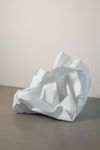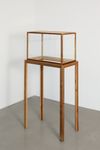Christian Andersen, Frederiksholms Kanal 28A, 1220 Copenhagen K, +45 2537 4101, info@christianandersen.net
Images
Press release
The essential difference between man and machine consists in the ability to be wrong without crashing. A main tenet in contemporary art is that the artist is free to do whatever he or she likes as long as the intentions or the references are in place (if not at least pretend they are). This rule is tied to the way the game is played and concerns to a great extent the tribulations regarding the daily vanity.
A deeper understanding of the scourge of vanity, as the consideration above stems from, was something that a friend of mine taught me a few years ago. Later when I, just as occupied by his words of wisdom, referred to our common understanding of the notion, he remembered nothing but instead attributed the wrongful honour for the golden thoughts to me.
In a similar way although not really, in terms of the loss of points of reference, I have over the last couple of years wondered if Lawrence Weiner ever made a piece with the text 'Two ships on the line of the horizon'. I think it sounds plausible. If however it is just something I make myself believe, then I have considered using the sentence without knowing quite why. The choice for or against depends on my vanity, but the intention is also lost in the same way as when I with logic try to answer the following riddle: A man meets two brothers in a crossing. One is a notorious liar; the other always speaks the truth. It is not evident how the roles are distributed. With just one single question to each, the man has to determine from the two brothers' answers which road will lead him to the awaiting treasure. And I, who most often find the greatest inspiration in unintentional misreadings and loose references, cannot any longer be gratified with not knowing the answer.
Pind, 2011





